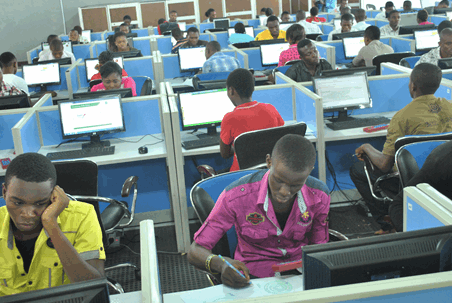The education ministry has set a 2027 target to make its senior secondary certificate examination (SSCE) system 100 percent computer-based.
SSCE administration in Nigeria have, in recent years, have been scrambling to go fully digital, with some citing practical difficulties.
The West African Examination Council (WAEC), in 2023, adopted a hybrid system where objective tests were computer-based while the essay/practical papers were hybrid.
Tunji Alausa, minister of education, spoke in Abuja on Thursday while inaugurating a committee to improve the quality of examination.
Advertisement
Alausa said the committee, chaired by the registrar of the Joint Admissions and Matriculation Board (JAMB) Ishaq Oloyed, has been tasked with standardising examination practices and ensuring quality.
He emphasised the government’s commitment to tackling widespread examination malpractices and enhancing the overall quality of the nation’s educational assessments.
Alausa said tackling examination leakages requires a holistic approach, as students are not the only culprits in examination malpractices.
Advertisement
The minister said parents contribute to examination malpractices by encouraging their wards.
He added that teachers, school principals, and supervisors are also culpable in the rising examination malpractices in the country.
“So, we’re planning that by 2027, all our exams will be computer-based. We will work so hard to ensure that that happens. We have to use technology to help our endeavour,” he said.
“The committee will also be working with local swapping of candidates.
Advertisement
“There are multiple participants in exam practices. From the student to parents, teachers, principals, to even people regulating and supervising exam conduct.
“During this change, a lot of areas of compromises will happen. There will be people investigating and regulating the exams.”
Alausa outlined several goals which the committee was set up to achieve, including eliminating examination leakages, addressing identity theft in examinations, and improving examination supervision.
He stressed the importance of transitioning to computer-based examinations by 2027 and combating local swapping of candidates during examinations.
Advertisement
The minister said this will be made possible by increasing the funding of education, with a strong focus on human capital development.
He announced that examination certificates would now feature three key identifiers: national identification numbers, candidates’ photos, and birthdates to ensure the authenticity of results.
Advertisement
He described examination malpractice as a growing threat, warning that allowing it to persist would undermine the efforts of diligent students striving to improve themselves.
“I’ve mandated all the registrars of our examination bodies, such as WAEC, NECO, and NAPTEB that by their next examinations scheduled for May, June and July, there will be three identifiers on the certificates they issue,” Alausa said.
Advertisement
“These identifiers will be the national identification number of the candidates, the picture of the candidate on the certificates and their date of birth.
“By having these three identifiers, we will ensure almost 100 per cent certainty in identifying candidates.”
Advertisement
Add a comment











